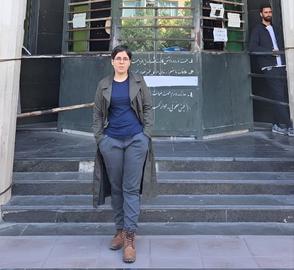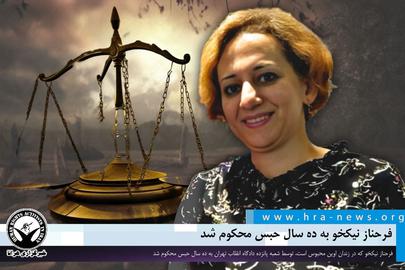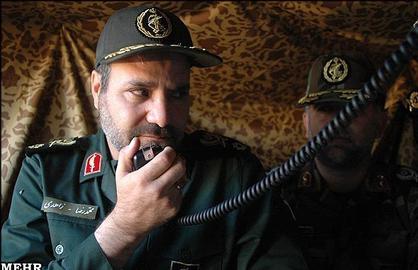Sepideh Qolyian, a civil activist, faced her initial arrest in February 2017 for her involvement in civil activities.
Subsequently, in 2019, amidst labour protests in Khuzestan province and the strike of Haft-Tappeh refinery workers, she was temporarily released after posting bail.
However, before serving her five-year sentence, she encountered multiple arrests.
Through various media outlets, she shed light on the tortures inflicted upon prisoners.
Instances of abuse included men beating women, verbal insults and obscenities directed at women, prolonged interrogations, eavesdropping on private conversations, and restricting access to telephones for external communication.
Women were coerced into wearing underwear within confinement, subjected to extreme temperatures, and humiliated through public strip searches in prison yards as a means of punishment and deterrence.
Additionally, forced confessions captured on camera were commonplace.
Qolyian wrote a book detailing her detention experiences in the Dezful Intelligence Department and Sepidar Women's Prison in Ahvaz.
Her book, published by IranWire, received significant acclaim from readers.
In her latest work, also published by IranWire, Qolyian delves into further encounters from Ahvaz, Bushehr, and Evin prisons.
Through ten narratives and recipes for popular sweets among prisoners, she encapsulates their plight and resilience.
Having spent over five years in prison, Qolyian faced additional sentences, including two years for insulting the leader of the Islamic Republic.
Nonetheless, she utilized her time behind bars to pursue education, earning a bachelor's degree in law through correspondence courses.
Currently, she is preparing to sit for the criminal law master's entrance exam and the bar exam.
In the introduction of her book, Qolyian reflects on her journey through the Islamic Republic, viewing it as an opportunity to construct something new—a testament to her commitment to shaping a better future for Iran.
She emphasizes the need to prevent the resurgence of oppression and tyranny, highlighting the dangers of unchecked political power and the importance of accountability.
In an interview with IranWire, Qolyian delved into the thematic core of her book, focusing on scandal, the personal space afforded to prisoners for writing, maintaining a balance between reality and imagination, and the emotional rollercoaster of the writing process.
Congratulations on the release of your second book. Tell us about it.
I still find it surreal to refer to it as a book. There are moments when I catch myself thinking, "A book? When did that happen?" Then I remind myself, "Well, my collection of cooking recipes."
It's amusing how it's now my turn to lull you to sleep with tales! Nonetheless, I sincerely appreciate your attentive reading and being the first person with whom I'll discuss the book.
Indeed, women have always been deemed scandalous. This has been my reality, shared by countless other women I've encountered.
Life has dealt me its fair share of hardships, and they persist to this day. Have you ever endured such severe beatings that you were unable to walk for days simply because of a photograph interrogators showed your family? Such experiences are not common among men.
Being a woman comes with its own set of challenges, particularly when you're expected to meet a stranger's gaze and feign laughter.
I've lived every second under the weight of scandal, especially now that my entire life is under constant surveillance by cameras. I once wondered if I'd ever experience a romantic kiss again after regaining my freedom.
The answer I gave myself: Never! How can I be certain there isn't a hidden camera in my bedroom, accessible to interrogators? The scandal feels suffocating as if it's ringing in our ears!
Who do you envision as the audience for your book? Did you have a specific demographic in mind while writing, such as young readers or activists, and were you conveying a particular message to them?
I have a duty—a commitment—to the women I've shared life with.
Documenting their experiences is a crucial aspect of this commitment. I wish for everyone to read this book, even those who harbor animosity towards me.
I envision receiving messages like, "You're a son of a bi*ch! Your pumpkin tart was terrible."
To which I'll reply later, "I apologize, my friend. I am a human being, but not a son of a bi*ch. Let's write letters to each other."
I hope a young girl, possibly facing future arrest with uncertain release, will read this and understand that abortion is a woman's right—a right unjustly stripped from her.
I want her to grasp that the seemingly impossible is achievable, especially for women. These sentiments aren't merely written from my heart; they encapsulate everything within it.
I've written these words to be recorded, to be read, and for the narratives and traumas of women's detention, torture, and imprisonment to be widely acknowledged.
My intention is to convey our commitment to resist bitterness, even amidst adversity.
In the concluding section of the book, there's a brief reference to the political and social events surrounding April 2021. However, notably absent is any mention of the "Woman, Life, Freedom" movement and its associated endeavors. Could you please clarify when this book was written?
I was incarcerated in Bushehr prison from February 2021 to September 2021.
In the initial stages of my narrative, I occasionally referenced Bushehr and the women I encountered there.
To be more specific, I chronicled the quarantine episode involving 16 Kurdish women and 8 children.
During that period, the Kurdish women had just been released, and the section in question had been repurposed for quarantine. I wrote these accounts in November 2021.
To be precise, the actual writing process took about 20 days, although the concept of narrating through baking sweets in prison had been brewing in my mind long before I put pen to paper.
This is why we initiated a confectionery workshop in Bushehr and endeavored to sustain it.
Throughout the narrative, I continually allude to Bushehr and its inhabitants. Bushehr remains a significant presence until the conclusion of the book.
However, all the narratives pertain to events preceding November 2021, and I refrained from altering the text.
Notably, my interview with Narges Mohammadi corresponds to a brief medical leave from Bushehr prison.
Despite developing a closer bond with Nargis during my time in Evin, I resisted altering the interview, fearing that any changes might inadvertently alter the mood established in the original text.
I reasoned with myself, deciding to leave any additional ideas for future endeavors.
While I haven't yet addressed events occurring after November 2021, rest assured, I intend to do so. My mind is brimming with countless ideas, ready to take flight at the right moment.
How can one create a private and personal space conducive to writing and nurturing ideas while incarcerated?
You see, I am the youngest child in a large nomadic family. Growing up amidst family disputes and resolving clan issues has become second nature to me.
Throughout my childhood, I yearned for a space of my own—a sanctuary where I could pretend to be a unicorn prancing before a mirror that casts rainbows.
Consequently, I've grown accustomed to the absence of privacy. Indeed, adjusting to this aspect of prison life has been the most challenging.
However, my upbringing has endowed me with a remarkable ability to concentrate in any environment.
Whether lightning strikes or conflicts
arise from every direction, I can effortlessly immerse myself in baking sweets and documenting people's stories. If you seek further insight into this, I encourage you to consult Bahareh Hedayat.
As you were writing, how did events occurring outside the narrative space—whether bitter or sweet experiences within the confines of prison or personal and impersonal occurrences in the broader political and social sphere—affect your writing process?
These facets are deeply intertwined and inseparable. Despite never stepping outside prison walls, the memory of my arrest feels as fresh as if it were yesterday, as though I inhabit both the streets and the minds of people around me.
At times, I even question whether I am truly imprisoned, and the slightest taste of freedom sends tremors through my hands and thoughts.
Throughout the day, my mind often wanders to what I would do if I were liberated tomorrow.
I envision inviting people to gather at the Dezful Bridge. The boundary between prison life and the world beyond blurs, leaving me feeling incredibly close yet agonizingly distant from the freedom I crave.
Have you and your friends in prison experimented with all the sweet recipes in the prison workshop, and are these recipes truly derived from prison experiences?
I prepared sweets for all the inmates at Sepidar, Evin, and Bushehr prisons.
Anyone who claims otherwise is simply not telling the truth; I made sure everyone received sweets, even if I had to insist.
I crafted over 100 varieties of sweets and 70 types of cakes for birthdays, special occasions, and gatherings.
All the recipes were developed during my time in prison, despite my lack of culinary talent.
However, in Qarchak prison, as I was assigned to the kitchen, I couldn't bake sweets. Instead, I cooked meals for all the inmates there.
No one can deny enjoying Sepideh's cooking during my time in Qarchak, just as no one in Bushehr can say they missed out on Sepideh's cookies.
In the same introduction, as well as in the various explanations provided in the media before its release, you mentioned that your stories about incarcerated women are documentary in nature, and out of respect, you altered the time, place, and some names. How did you manage to maintain your distance from the narrative while utilizing a first-person narrator, and how did you strike a balance between imagination and reality?
All the names in the book are real, except for one woman's name, which remains undisclosed and could potentially be hers.
This alteration was made for personal reasons. The names mentioned throughout the narratives are authentic, and each story is grounded in reality.
However, imagination adds flavor to our lives. For instance, when I speak of the moving island and how we've sheltered it, it's purely a product of imagination. In prison, we are often compelled to navigate a blend of fantasy and reality, a mindset ingrained in our daily existence.
In prison, where reality often feels surreal, we find ourselves compelled to infuse our narratives with even more imagination than what is typical outside its confines.
By creating this distance between reality and imagination, I aim to prompt discussions about integration. Otherwise, the lines between the two become indistinguishable.
Who do you prefer not to read your book?
Why would I wish for anyone not to read? I want everyone to read, even my interrogators. I want them to read every line meticulously and take notes.
I hope that ordinary people will read it as well. Everyone should read it, and as I've mentioned before, criticism is also welcomed.
In the introduction of the book, you took another bold step by including a phone number, encouraging readers to reach out to you through it, suggesting that it's safer than corresponding through traditional prison channels. Are you not concerned about possibly causing a problem?
Thank you for appreciating the decision. Personally, I don't perceive it as particularly bold; rather, it aligns with my nomadic approach.
Additionally, I'll be including an email address for easier and more accessible communication. However, it's crucial to emphasize the importance of observing strict security measures.
I eagerly await your letters and stories and hope to connect with you. Rest assured, no two-legged man can trace my whereabouts!
I must stress, though, that while I'm keen to receive your correspondence, please refrain from disclosing any personal information through these channels. Anonymity is paramount in our exchanges.
visit the accountability section
In this section of Iran Wire, you can contact the officials and launch your campaign for various problems






























comments